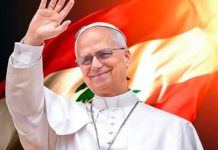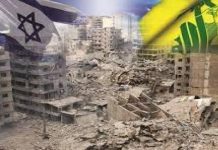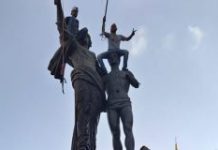When It Comes To Africa, Genocide Seems To Be In The Eye Of The Beholder
By Amb. Alberto M. Fernandez/MEMRI//October 30/2025
That there is widespread and long-lasting slaughter of Christians in Nigeria (and elsewhere in Africa) there is no doubt.[1] In response to cries in the West that genocide is being committed against Christians, some officials in Nigeria have pushed back, minimizing the religious and ethnic dimension of the mass killings.This view – that what is happening in Nigeria is not terrorism and not religiously or ethnically based – is not new. Fifteen years ago, when I was a diplomat in the State Department’s Africa Bureau (AF), I heard the same explanation from our leadership (who heard it from the Nigerians): The problem was not terrorism but merely conflict between pastoralists and farmers.
This is the context of an opinion piece that appeared in Al-Jazeera English on October 2, 2025 by an advisor to Nigeria’s Vice President. The piece lamented that “coordinated attacks on Nigeria’s nationhood have swept across social media, blogs and television outlets, alleging a so-called ‘Christian genocide.’ These attacks, driven by foreign actors, mischaracterize Nigeria’s domestic conflicts, ignore its complexities and manipulate longstanding ethnic and resource-based tensions to advance sectarian agendas.”[2]
There is no doubt that conflicts are always complicated and Nigeria is no different. Some of the violence in that country is perpetrated by terrorist groups, some by ethnic Fulani militias, some by criminal bandit gangs, of which there is an abundance.[3] Both Muslims and Christians are victims and many Nigerians blame the government – a weak and corrupt, absent and incompetent state – as the ultimate reason for the violence.
Still others have noted that the problem was not so much the state or the government but a specific government, the former regime of President Muhammadu Buhari, and that the current government of President Bola Ahmed Tinubu was far better in terms of interfaith relations and fighting terrorism.[4] But “ethnicity and religion” do matter greatly in Nigeria’s conflict, something that Al-Jazeera’s opinion piece downplays.[5] As one Nigerian Catholic bishop noted recently, it is “too shallow to say that Nigeria’s violence is only about religion and it is equally false to deny that religion plays a part at all.”[6]
There is, of course, great irony in this piece appearing in Al-Jazeera, an Islamist media outlet funded by the state of Qatar. Al-Jazeera, in both Arabic and English, has been in the forefront of trumpeting that the terrible war unleashed by Hamas on October 7, 2023, was an example of Israeli genocide against Palestinians in Gaza.[7] That the war saw the death of many Gazan civilians there is no doubt. The war between Hamas and the IDF was fought within the dense urban fabric of the Gaza Strip; this was always an essential part of the terrorist group’s defense strategy after its invasion of Israel.[8]
As far as I can recall, Al-Jazeera generally does not see genocide at all when it involves Christians or Jews as victims (except maybe when Palestinian Christians can be portrayed as victims of Israel). The network has decades of experience in downplaying the killing of Christians – whether by ISIS or by Islamists like the Muslim Brotherhood – at the hands of Muslim perpetrators. This is not so surprising given the network’s longstanding Islamist world view.[9]
With the war in Gaza seemingly (for the moment) ending and most of the world not very interested in what is happening in distant Ukraine, global attention has finally shifted to what has been the world’s worst humanitarian crisis: the war in Sudan.[10]
Here the “genocide” word discounted in Nigeria has emerged again with supreme irony.[11] I was in Sudan when Al-Jazeera assured us that what was happening in Sudan was not genocide – neither in Darfur nor in South Sudan – almost 20 years ago. Today, Al-Jazeera says that was is happening in Sudan is genocide.[12] How can it be that the same conflict, committed by some of the same people in the same places against the same victims, was not genocide 20 years ago but is genocide today?
The reason is that 20 years ago, Al-Jazeera and its patron Qatar were closely allied with the Islamist regime of President Omar al-Bashir that was committing the killings in Darfur. So, they downplayed the slaughter then. Back then, Al-Jazeera decried American “interference” in Sudan’s affairs, today they call for America to take a side in Sudan.
Today the national security establishment in Sudan that committed the slaughter 20 years ago has split. Part of it, the Rapid Support Forces (RSF), are allied to one Gulf state (United Arab Emirates) while the other, the Sudanese Armed Forces (SAF) is allied to another Gulf state (Qatar). RSF has support from regional states in Libya, Chad, and Ethiopia. SAF has support from regional states in Egypt and Eritrea. The Russians have supported both sides. Rivals Iran and Turkey have supported SAF. Despite the rhetoric in some quarters,[13] both RSF and SAF (General Al-Burhan met with Israeli Prime Minister Netanyahu in Uganda in 2020) are open to ties with Israel. Neither Israel nor the United States are a major factor in the civil war.
The Janjaweed Darfur Arab fighters of the RSF were an integral part of the Bashir regime, and were directed and armed by the military, the same military that fights them today. An honest person who respects the historical record could say that the conflict between RSF and SAF is between two genocidal forces (or between two “merely” brutal and hypocritical belligerents). One thing is clear: Neither SAF nor the RSF ever purged themselves of the violence of the past; both are largely the same institutions they were before, often led by the same perpetrators.
One can say that the actions of the Janjaweed today are more “genocidal” than the actions of SAF today, that RSF has uniformly behaved more brutally in the war than SAF has, although neither side has clean hands. The whitewash is not limited to one side.[14] To a large extent, the conflict does juxtapose the “chaos” of the RSF to the “tyranny” of SAF. Both sides fight fiercely – the Sudanese in general are brave and good fighters – but SAF has much more experience in running things, albeit with a heavy hand. One truth often obscured is that neither belligerent – neither SAF nor RSF – fully represent the Sudanese people, a multifaceted polity with a complex political and social reality on the ground.[15]
That the army-controlled government functions more as a government than whatever rudimentary civil administration RSF has in place should not be a surprise. SAF represents the military arm of Sudan’s traditional Northern Nile elite who have, since independence, governed (or misgoverned) Sudan.
The Janjaweed or RSF are the epitome of something Khartoum did for decades – unleashing rude, marginalized tribal levies to wreak mayhem and slaughter against their enemies. When they boast about what they are doing today, the RSF is following a pattern going back decades, all done under the watchful eye of the central government in Khartoum. But the RSF in 2019 and 2023 turned against their more “civilized” masters. What Khartoum had used against the distant Dinka and Nuer of the South, the Nuba of Kordofan, and the African tribes of Darfur was now turned against Khartoum itself. In the end, for RSF and SAF, for Al-Jazeera and Qatar, and for others with vested interests, it turned out that genocide is not what my friends and I did against “them,” but what “they” do against me and mine.
*Alberto Fernandez is Vice President of MEMRI.




















